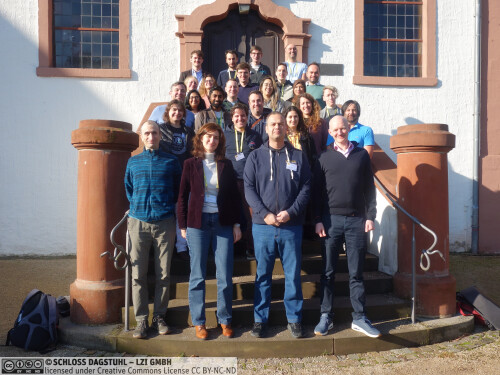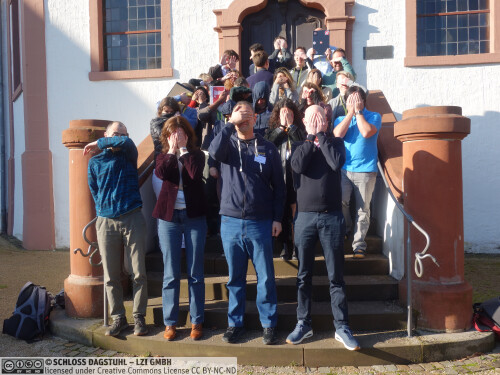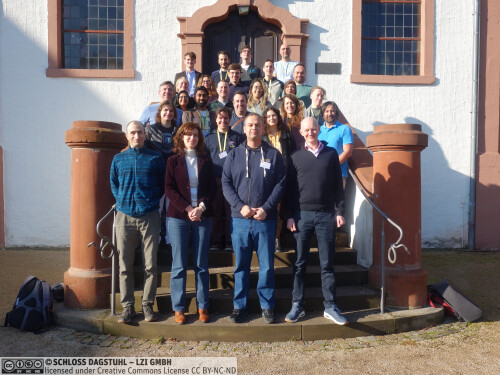Dagstuhl Seminar 25042
Online Privacy: Transparency, Advertising, and Dark Patterns
( Jan 19 – Jan 22, 2025 )
Permalink
Organizers
- Gunes Acar (Radboud University Nijmegen, NL)
- Nataliia Bielova (INRIA - Sophia Antipolis, FR)
- Zubair Shafiq (University of California - Davis, US)
- Frederik Zuiderveen Borgesius (Radboud University Nijmegen, NL)
Contact
- Marsha Kleinbauer (for scientific matters)
- Christina Schwarz (for administrative matters)
Shared Documents
- Dagstuhl Materials Page (Use personal credentials as created in DOOR to log in)
Schedule
The Dagstuhl Seminar on Online Privacy: Transparency, Advertising, and Dark Patterns enhanced the collective understanding of changes in online tracking, advertising, and dark patterns within an interdisciplinary research community in computer science and law. Following the success of the 2017 Dagstuhl Seminar “Online Privacy and Web Transparency”, this seminar brought together experts from academia, legal professionals, regulators, and industry to tackle novel challenges emerging from the shifting technological and regulatory landscape.
More than half a decade after the 2017 seminar, some of the familiar questions have resurfaced in new contexts, such as smart devices and augmented reality. The introduction of privacy regulations and enforcement regimes around the world has prompted and enabled a slew of new research. Meanwhile, browsers and mobile platforms have started shipping built-in anti-tracking features, and a once-in-a-generation redesign of the online advertising and tracking ecosystem is underway.
Spanning three days, the seminar featured a variety of session formats including short talks, interactive demos, and moderated brainstorming sessions. Bringing together researchers and industry experts, the seminar promoted collaboration and advanced research on these challenges, while also exploring future research directions. Topics that were discussed during the seminar included the following:
Online Tracking Beyond Cookies
How should online tracking research respond to fundamental changes in tracking mechanisms after the third-party cookie phaseout?
Which techniques, tools, and methods could prove beneficial and are currently absent in researchers’ toolboxes?
Do existing regulations provide sufficient protection against novel types of tracking and profiling?
How can computer science research help regulators with enforcement of regulations, or with developing better regulations?
Alternative Advertising Mechanisms
- What are the potential abuses associated with the novel advertising mechanisms (e.g., Topics API, Protected Audience API), and what measures can be implemented to monitor and prevent them?
Dark Patterns and Online Manipulation
- What methods and strategies are effective for detecting privacy-related dark patterns in various contexts, and how do these dark patterns influence both immediate and future privacy decisions of users?
Structure of the 3-day seminar
- Day 1 – morning
-
A plenary opening session laying the ground for the seminar, presentation of the main research topics and statistics on the participants topic interest, field of work, and background, was given to quickly foster exchanges since computer science and law experts often express the will to exchange but do not have the opportunity. Therefore, the seminar started with two sessions that enabled everybody to introduce themselves to the others. The morning session was followed by informal voting on the participants’ interests in the proposed main topics and background. Topics for further discussion in working groups were identified.
- Day 1 – afternoon
-
The first session consisted of group activities on identified topics and a report of the main outcomes in the plenary session. The afternoon continued with the presentation of a browser vendor representative presenting the open problems in web tracking from an industry perspective. The last session in the afternoon featured a panel with lawyers and regulators discussing open problems in compliance, regulation, and enforcement from the EU and US perspectives.
- Day 2 – morning
-
The first session of presentations from an academic researcher on privacy signals and a browser vendor were appreciated by the participants. The morning session was followed by further group activities to discuss new topics of interest that evolved since Day 1. The morning finished with a wrapping-up session presenting the results of each group discussion.
- Day 2 – afternoon
-
The afternoon contained two sessions: presentations from legal scholars on the challenges and advancements in the EU law and new forms of transdisciplinary research between computer science and law researchers. The second session offered a panel with browser vendors, presenting unique insights into their challenges with online tracking, regulation and dark patterns to the audience.
- Day 3 – morning
-
On Day 3, there was a session with short (5 minutes) rump session talks. There was also a collective discussion on the main takeaways of the seminar with collection of feedback from the participants. It was followed by an informal session to foster further exchanges between participants who have identified common topics of interest.
Results, summary
- The seminar enhanced the collective understanding of changes in online tracking, advertising and dark patterns within an interdisciplinary research community in computer science and law.
- The seminar built a community of researchers from different disciplines who are interested in online privacy, and established further exchanges with industry and regulators.
- The seminar fostered transdisciplinary cooperation for research and future grant proposals, such as EU grants (EU collaborative projects and ERC synergy grant), bilateral agreement grants within EU countries but also EU-US, and EU-India.
- The seminar raised awareness among participating researchers about the challenges and opportunities for collaboration across computer science and law disciplines, leading to better understanding of empirical research.
- During the seminar, several participants formed interdisciplinary teams to collaborate on papers and grant proposals in the future. One of the already visible outcomes of the seminar is a new article co-authored by several participants surveying the advances and open problems in web tracking [1].
- A collaboration that started at our seminar led to the discovery of a previously undocumented tracking method, used by Meta and Yandex to track billions of Android users. The investigation led by two attendees of our seminar resulted in defenses deployed by browser vendors including Chrome and Firefox, and termination of the tracking campaign by the companies [2].
References
- SoK: Advances and Open Problems in Web Tracking. Y. Vekaria, Y. Beugin, S. Munir, G. Acar, N. Bielova, S. Englehardt, U. Iqbal, A. Kapravelos, P. Laperdrix, N. Nikiforakis, J. Polakis,F. Roesner, Z. Shafiq, S. Zimmeck. Online report, June 2025. https://arxiv.org/ abs/2506.14057
- Covert Web-to-App Tracking via Localhost on Android. Aniketh Girish, Günes Acar, Narseo Vallina-Rodriguez, Nipuna Weerasekara, Tim Vlummens. Online report, June 2025. https://localmess.github.io
 Gunes Acar, Nataliia Bielova, Zubair Shafiq, and Frederik Zuiderveen Borgesius
Gunes Acar, Nataliia Bielova, Zubair Shafiq, and Frederik Zuiderveen Borgesius
This Dagstuhl Seminar aims to enhance the collective understanding of changes in online tracking, advertising, and dark patterns within an interdisciplinary research community in Computer Science and Law. Following the success of the 2017 Dagstuhl Seminar “Online Privacy and Web Transparency” (Bielova, Laoutaris, Narayanan, and Nikiforakis), the new seminar will bring together experts to tackle novel challenges emerging from the shifting technological and regulatory landscape.
More than half a decade after the 2017 seminar, some of the familiar questions have resurfaced in new contexts, such as smart devices and augmented reality. The introduction of privacy regulations and enforcement regimes around the world has prompted and enabled a slew of new research. Meanwhile, browsers and mobile platforms have started shipping built-in anti-tracking features, and a once-in-a-generation redesign of the online advertising and tracking ecosystem is underway.
Spanning three days, the seminar will feature a variety of session formats including short talks, interactive demos, and moderated brainstorming sessions. Bringing together researchers and industry experts, the seminar will promote collaboration and advance research on these challenges, while also exploring future research directions. Topics to be discussed during the seminar include, but are not limited to the following:
- Online Tracking Beyond Cookies
- How should online tracking research respond to fundamental changes in tracking mechanisms after the third-party cookie phaseout? Which techniques, tools, and methods could prove beneficial and are currently absent in researchers' toolboxes?
- Do existing regulations provide sufficient protections against novel types of tracking and profiling? How can Computer Science research help regulators with enforcement of regulations, or with developing better regulations?
- Alternative Advertising Mechanisms
- What are the potential abuses associated with the novel advertising mechanisms (e.g., Topics API, Protected Audience API), and what measures can be implemented to monitor and prevent them?
- Dark Patterns and Online Manipulation
- What methods and strategies are effective for detecting privacy-related dark patterns in various contexts, and how do these dark patterns influence both immediate and future privacy decisions of users?
 Günes Acar, Nataliia Bielova, Zubair Shafiq, and Frederik Zuiderveen Borgesius
Günes Acar, Nataliia Bielova, Zubair Shafiq, and Frederik Zuiderveen Borgesius
Please log in to DOOR to see more details.
- Gunes Acar (Radboud University Nijmegen, NL) [dblp]
- Jason "Jay" Barnes (Simmons Hanly Conroy - New York, US)
- Nataliia Bielova (INRIA - Sophia Antipolis, FR) [dblp]
- Igor Bilogrevic (Google - Zürich, CH) [dblp]
- Yana Dimova (DistriNet, KU Leuven, BE) [dblp]
- Serge Egelman (ICSI - Berkeley, US) [dblp]
- Imane Fouad (INRIA Lille, FR) [dblp]
- Colin M. Gray (Indiana University - Bloomington, US) [dblp]
- Johanna Gunawan (Maastricht University, NL) [dblp]
- Hamed Haddadi (Imperial College London, GB) [dblp]
- Martin Johns (TU Braunschweig, DE) [dblp]
- Konrad Kollnig (Maastricht University, NL) [dblp]
- Athina Markopoulou (University of California - Irvine, US) [dblp]
- Rishab Nithyanand (University of Iowa - Iowa City, US) [dblp]
- Cristiana Santos (Utrecht University, NL)
- Zubair Shafiq (University of California - Davis, US) [dblp]
- Anastasia Shuba (DuckDuckGo - Paoli, US) [dblp]
- Sandra Siby (New York University - Abu Dhabi, AE) [dblp]
- Martin Thomson (Mozilla - Mountain View, US) [dblp]
- Vincent Toubiana (CNIL - Paris, FR) [dblp]
- Christine Utz (Radboud University Nijmegen, NL) [dblp]
- Narseo Vallina-Rodriguez (IMDEA Networks Institute - Madrid, ES) [dblp]
- Lesley E. Weaver (Bleichmar Fonti & Auld - Oakland, US)
- John Wilander (Apple - Cupertino, US) [dblp]
- Sebastian Zimmeck (Wesleyan University - Middletown, US) [dblp]
- Frederik Zuiderveen Borgesius (Radboud University Nijmegen, NL) [dblp]
Related Seminars
- Dagstuhl Seminar 17162: Online Privacy and Web Transparency (2017-04-17 - 2017-04-20) (Details)
Classification
- Computers and Society
- Cryptography and Security
Keywords
- Online tracking
- advertising
- dark patterns
- privacy
- data protection
- world wide web




 Creative Commons BY 4.0
Creative Commons BY 4.0
